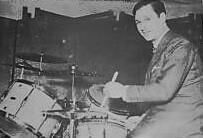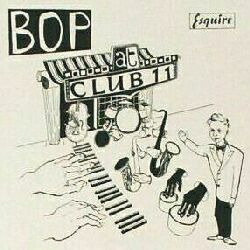










          |
| Carlo Krahmer and Esquire... |
 |
 Carlo Krahmer was born in Shoreditch, London in 1914 and was first and foremost a musician but was probably better known in the second half of his life as the man behind Esquire Records. It is no exaggeration to say that without Esquire there would be virtually no recorded history of British modern jazz from the late 1940s through to the mid 1950s.
Carlo Krahmer was born in Shoreditch, London in 1914 and was first and foremost a musician but was probably better known in the second half of his life as the man behind Esquire Records. It is no exaggeration to say that without Esquire there would be virtually no recorded history of British modern jazz from the late 1940s through to the mid 1950s.Carlo was friendly with Peter Newbrook, a confirmed record collector and 'jazz nut' and in the immediate post war years they became frustrated with the difficulties of getting jazz records and the fact that very little British jazz was being recorded. They decided that something had to be done to preserve the British jazz of this period (i.e. the birth of bebop) and founded Esquire Records as a company on December 13th, 1947, Carlo retiring from full time playing. In retrospect the launching of the company, just after the war, was a hazardous occupation with shortages of paper, shellac, recording equipment etc. but Carlo's innate enthusiasm and the business expertise of his wife Greta won through. From the late 1940's Krahmer did a great deal to encourage Victor Feldman giving him drum tuition and encouraging him to switch to the vibraphone, as well as recording the first titles under Feldman's own name. Esquire began as a record club, records only being available through mail order, but you needed a broad taste because the 10" and 12" 78's were a mixture of old and new style British jazz. Almost immediately the company undertook leasing deals with American record companies and modern jazz predominated. They issued the Charlie Parker Dials and later almost the entire Prestige catalogue. The company introduced the British record collector to to the names, (and beautiful music), of Scandinavian jazz, names such as Arne Domnerus, Lars Gullin, and Bengt Hallberg. Throughout Newbrook and Krahmer were firm in their support of the British modernists and home grown talent formed a large part of their catalogue. Some of the British artists Carlo recorded were for old times sake or because he genuinely loved the music they played. "I think Alan Clare plays fantastic piano, he would say, so I record him. The records don't sell of course". |
 Discographically Esquire was a boon to collectors. From the very earliest days they printed the recording dates and personnels on the labels or later the sleeves of the records.
Discographically Esquire was a boon to collectors. From the very earliest days they printed the recording dates and personnels on the labels or later the sleeves of the records.Besides Ronnie Scott other British beboppers were recorded early in their careers: Johnny Dankworth, Dennis Rose, Tommy Pollard, Victor Feldman, Eddie Thompson, (all from 1948) - Jimmy Deuchar, (1951) - Kenny Graham (1952), being just a few, later came Tommy Whittle, Harry Klein, Joe Harriott, and Vic Lewis. He was the first to record Cleo Laine. Full details of all their sessions are available from the discography page. The first Esquire records issued were by Carlo Krahmer's Chicagoans, recorded live at the Birmingham Town Hall on November 21st, 1947, but the first studio session was on January 1st, 1948. The 'studio' was a vast basement room at 76 Bedford Court Mansions, an address familiar to anybody who ever bought an original Esquire record. This first 'modern' session recorded four titles by the The Esquire Five, and featured Ronnie Scott who was 21 at the time. The group was assembled for the recording session only. The titles produced a 12" 78rpm record (12-002), and a 10" 78rpm record (10-002)... The Esquire Five - January 13th, 1948 (Esquire) Ronnie Scott (ts), Pete Chilver (g), Ralph Sharon (p), Jack Fallon (b), Carlo Krahmer (d). Lady Be Good(12-002)/Boppin' At Esquire(10-002)/Idabop(10-002)/What Is This Thing Called Love(12-002). Titles of the Esquire LPs and EP's issued are listed as many people still collect vinyl. Original modern jazz 78rpm catalogue numbers are also listed... From 1938 to 1949 Carlo Krahmer was an active musician who recorded with many prominent musicians of the time. Carlo Krahmer discography... Kitty Grime was a name that appeared on many Esquire records from the 1950s as writer of sleeve or liner notes... | ||
|
On April 9th, 1949 Esquire recorded a live concert at the King George Hall in London featuring the two bands playing at Club 11, then Britains' first and only bebop venue. Carlo Krahmer and his partner Peter Newbrook lugged the heavy studio based recorder round to the hall to capture the proceedings and become the first to record the first steps of the British modernists. The two groups recorded were the Ronnie Scott Boptet and the Johnny Dankworth Quartet. Fourteen tracks were recorded: 1 Wee Dot (Ronnie Scott Boptet) 2 Coquette (Ronnie Scott Boptet) 3 Bremavin (Johnny Dankworth Quartet) 4 Lover Man (Johnny Dankworth Quartet) 5 Scrapple from the Apple (part 1) (Ronnie Scott Boptet) 6 Scrapple from the Apple (part 2) (Ronnie Scott Boptet) (These six tracks were issued on three 10" 78rpm records as an album set: 10-036 (1,2), 10-037 (3,4), 10-038 (5,6)) 7 Don't blame me (Ronnie Scott Boptet) 8 A night in Tunisia (Johnny Dankworth Quartet) 9 Second Eleven (Johnny Dankworth Quartet) 10 Body and soul (Johnny Dankworth Quartet) (These four tracks were issued on two 12" 78rpm records: 12-007 (9,10), 12-011 (7,8)) 11 52nd Street Theme (Ronnie Scott Boptet) 12 Ow! (Ronnie Scott Boptet) 13 Stoned (Ronnie Scott Boptet) 14 Donna Lee (Ronnie Scott Boptet) (These four tracks were not issued until 1986 when Esquire issued an LP titled Bop at Club 11 (S315), that included all these fourteen tracks. The three disc "album" was reviewed in Jazz Journal by PT (Tanner?) who was not over impressed: "...Esquire have now turned their attention to local exponents of bop with somewhat mixed results. Though it is right that all forms of jazz expression should be given encouragement and Esquire have stepped in where the major companies fear to tread, the results are, generally speaking, more derivative than original.. these sides simply consist of British musicians copying, without overmuch original thought or ideas... Johnny Dankworth's Quartet come out best in my opinion... Johnny is a very fine alto player and his solo on lover man is the highlight of the album. Ronnie Scott's contributions seem less interesting, if only because so much of it has been said before ; and I fear better. The double sided Scrapple becomes very tedious with it's Afro-Cuban rhythm and it's rather stilted solo work, except that of Tommy Pollard on piano... the other two solos are very ordinary and mediocre and the rhythm section is over prominent." |
 The three 78rpm disc album was issued in 1949 with a cover (right) The three 78rpm disc album was issued in 1949 with a cover (right)The original sleeve note read: "Welcome to Club 11! This greeting is bellowed to the happy crowd by compere Flash Winston on the opening grooves of of the first side in this album, WEE DOT. It's also as good a way of introducing Club 11 to the public as any other we can think of right here.And indeed we hope that this album will bring into your home a goodly slice of what goes on at Club 11, which has now become recognised as the foremost Bop spot in London. If you don't already know what Club 11 stands for, a few words here will not come amiss. Briefly the club's history is this.... it is a co-operative organisation of eleven musicians and a true disciple of Bop, one Harry Morris, who acts as secretary, treasurer and general factotum of the troupe. Naturally thethis figure and the personnel fluctuate slightl from time to time. Since it's inception, the club has increased it's meetings from once a week up to the current Monday, Wednesday and Saturday schedule. In fact the whole affair became so popular that in April of this year, the club staged it's own all Bop Concert at the intimate King George Hall in the heart of London. The records in this album were recorded at the concert and we are happy to have made a further contribution to British jazz by bringing to your attention this collection of sides by our foremost Bop practitioners. Now to the music. Unlike most all star get togethers, this is not, strictly speaking, a Jam Session. The musicians that comprise the two groups featured in this album play together regularly and have thus absorbed one another's ideas and moulded them into a closely knit pattern, which is more satisfying than when musicians of widely diverging styles are thrown together and expected to produce balanced results.From this we do not mean to infer that these records are perfect, because unlike studio recordings the musicians have only one chance to say their piece. Therefore clinkers must creep in from time to time. But this is more than offset by the wonderful atmosphere obtained when musicians are playing to an appreciative audience, as is the case here. We leave you know to enjoy the music of the Johnny Dankworth Quartet and the Ronnie Scott Boptet, and echoing Flash Winston's words we say.... Welcome to club 11! (Peter Newbrook and Carlo Krahmer) | ||